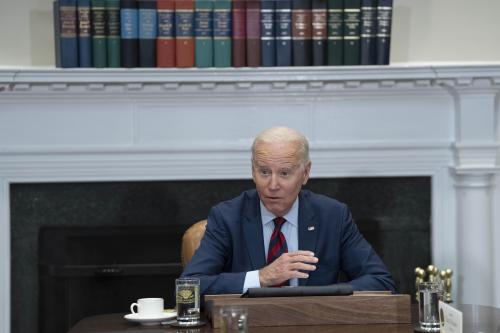With the bruising fight to select a speaker behind them, Republicans have begun executing their oversight plans for the 118th Congress, with a focus on issues like the origins of the COVID-19 pandemic, the handling of classified documents, and the Biden administration’s border policies.
On some issues—like the House GOP’s plans to investigate Hunter Biden—Republicans will clearly use the chamber’s oversight apparatus towards different ends than their Democratic colleagues. But on other topics, judging the change in direction requires a sense of what Democratic-led committees have focused on over the past two years.
Using data we’ve been gathering on oversight of the executive branch, we can begin to answer that question. Between the start of the 117th Congress in 2021 and September 2022, congressional committees undertook more than 900 actions we’d label oversight—a combination of hearings held, and letters sent—of the executive branch. Roughly 26% of that activity involved national defense issues. Efforts were spread out across a number of House committees, including Armed Services, Foreign Affairs, Homeland Security, Oversight, Veterans’ Affairs, Energy and Commerce, Judiciary, Appropriations, and the Select Committee on January 6, as well as several Senate panels, such as Armed Services, Foreign Relations, Homeland Security and Governmental Affairs, Judiciary, and Veterans’ Affairs) and generally covered one of four broad categories: homeland security, cybersecurity, veterans’ issues, and military affairs.
While our data can’t tell us why Congress did this much oversight on defense issues (defined broadly, to include homeland security), there were no shortage of related matters high on the national agenda in 2021 and 2022. The insurrection at the U.S. Capitol on January 6, 2021, exposed a series of security and intelligence failures. Major cybersecurity breaches on all levels of government and in private corporations have had far reaching consequences. Developments domestically and abroad have raised various concerns on the state of the military, from sexual assault within the military, to the condition of F-35 jets and their effectiveness. The ongoing COVID-19 pandemic also drew continued attention to veterans’ health issues.
Looking first at letters sent by House and Senate committees, we see that panels sent 152 letters related to oversight of defense issues. Almost 60% of these came from the Select Committee to Investigate the January 6 Attack on the U.S. Capitol. The committee operated on a largely unanimous, bipartisan basis—a departure from much of the other, letters-based defense oversight conducted by the 117th Congress. Of the remaining letters sent by House and Senate committees, only about a fifth were signed by a panel’s Democratic chair and Republican ranking member.
Hearings, meanwhile, tended to focus more broadly on various military affairs issues; between the House and Senate, there were 47 oversight hearings, examining a broad mix of topics such as the condition and preparedness of the armed forces, both domestically and abroad, and American operations in countries such as Syria and Afghanistan.
Veterans Affairs was also another common area of focus, with both chambers holding 14 hearings on this issue. In these hearings, committees focused on the quality, accessibility, and effectiveness of resources the government is providing to our veterans. More specifically, committees examined how servicemembers transition back into civilian life, healthcare for veterans amid the COVID-19 pandemic, and improving the VA (Veterans Affairs) health care system. In addition, six oversight hearings were held on cybersecurity concerns.
We know the oversight landscape will look different as the 118th Congress continues; in addition to focusing on new areas, they have indicated plans to take existing investigations, like the one into the January 6 insurrection, in different directions. Other issues—like those related to military families –have proven to be fertile ground for bipartisanship in the past, but whether an appetite for that still exists under divided party control remains to be seen.









Commentary
Defense oversight in the 117th Congress
February 3, 2023